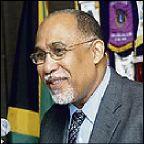Gareth Manning, Gleaner Writer
Morgan
CUSTOMERS OF utility companies should expect no protection from the Office of Utilities Regulation (OUR) against bill
payment companies which are charging fees for the payment of utility services.
Since the advent of bill payment agencies, such as Paymaster and Bill Express, many utility companies have been closing down their own bill payment services and outsourcing them, limiting their
customers' service-free bill payment options. Service fees being charged by bill
payment agencies are in the range of $30 and $35 per transaction. This means an average customer paying his regular bills for electricity, water, cable and telephone, would be subjected to a cost of between $120 and $140, in addition to his bills.
But OUR director general J. Paul Morgan told The Sunday Gleaner that under their current licences, utility companies are not obliged to provide customers with bill pay options that do not necessarily attract a service fee. This is so, he explained, be-cause bill payment agencies came into operation after the formulation and granting of licences to utility companies.
Consequently, there is no clause in their licences that bind utility companies to provide bill payment options for the customers that do not attract service fees.
OUTSOURCING AGREEMENT
Recently, Cable and Wireless, signed an outsourcing agreement with Paymaster, giving the agency full rights to carry out some of its customer service responsibilities, including bill payment services. The Jamaica Public Service Company (JPS) signed a similar agreement in March,
giving Paymaster the rights to collect bill payments on its behalf.
Morgan, however, insists that customers of utility companies should not be subjected to service charges if the bill payment agency is situated within the utility company itself.
"If you are going to Cable and Wireless to pay a bill, we insist that you shouldn't pay a service charge upon payment of that bill. However, you may be charged a service fee for other transactions," he told The Sunday Gleaner.
"Quite frankly, we have asked Cable and Wireless to look back at that agreement [with Paymaster]," Morgan said. "We would probably have a difficulty enforcing it. We would have to refer them back to the tariff. We would have to think about it in the office. I don't think the companies would disagree with the position," he adds.
With the rise in bill payment agencies, the OUR says it is not sure there are enough free options for customers, even though customers can pay their bills at commercial banks and building societies and by Internet. As it stands, however, customers cannot pay late bills through the bank.

